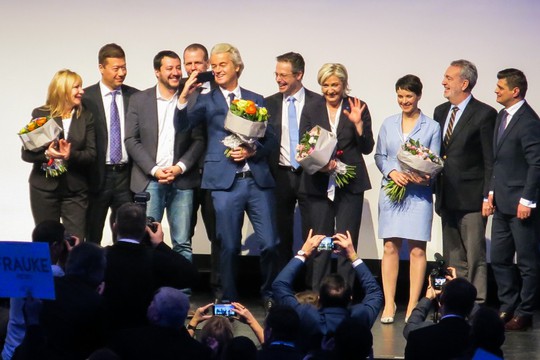The Netherlands has a governing agreement for a new right-wing ruling coalition after six months of negotiations following the election victory of Geert Wilders in November 2023. Оn this photo Wilders (with a phone in hand) captured with like-minded party leaders from other European countries.
Photo: AFP
Geert Wilders’ far-right party is set to become part of the Dutch government — and the shockwaves won't take long to hit the EU machine in Brussels.
After six months of wrangling and painful negotiations, the Netherlands finally has a governing agreement for a new right-wing ruling coalition. Since Wilders startled Europe with his election victory last year, the chances of the veteran firebrand becoming prime minister and joining the EU summit table have faded, writes POLITICO.
If the coalition deal is confirmed, a new government will star Wilders' far-right Party for Freedom (PVV) along with the center-right People’s Party for Freedom and Democracy (VVD), the right-wing populist Farmer-Citizen Movement (BBB) and the centrist New Social Contract (NSC). It is unlikely to represent business as usual.
The most immediate headache for the EU establishment will likely be the new Dutch migration plans. The coalition wants to have the "strictest asylum policy ever" via a temporary crisis law. It wants to opt out of certain EU migration rules, setting The Hague on a collision course with Brussels, which has just agreed a new pact on migration and asylum.
A second thorny issue is enlargement of the 27 country bloc. The Netherlands was already one of the stricter players in the EU, arguing that countries should move toward European accession based on internal reforms, not geopolitical considerations. The new coalition will focus even more on this merit-based process.
That's potentially bad news for countries like Ukraine, which has been pushing for a fast track to EU membership.
Wilders’ Euroskepticism and fiscal frugality will tie the hands of the new Dutch prime minister and Dutch diplomats in the EU — who have a reputation for punching above their nation's weight in the negotiating room. They're unlikely to have the same flexibility to wheel and deal as under outgoing Prime Minister Mark Rutte, such as on joint borrowing for defense or expanding the EU’s upcoming budget.
Rutte was already known as “Mr No” in Brussels for opposing EU joint borrowing in any form. Things will only get worse with Wilders as kingmaker of the new Dutch government.
When Rutte grudgingly approved the EU’s €700 billion post-pandemic recovery fund in 2020, Wilders accused him of throwing away Dutch taxpayer money to bail out the tax-dodging Italians. The new government wants to reduce payments by the Netherlands to the EU. This goes directly against calls from European leaders such as French President Emmanuel Macron to expand the bloc’s budget or increase joint borrowing to finance defense.
These discussions will take center stage during upcoming negotiations on the EU’s new multi-year budget, which will take effect in 2028. Last time around, the talks culminated in a five-day marathon summit of leaders. Given the EU's current challenges — from defense to the green transition — the talks were already likely to be more difficult, and that was before a demand by the Netherlands to pay less into the pot.
read more in our Telegram-channel https://t.me/The_International_Affairs

 11:48 20.05.2024 •
11:48 20.05.2024 •























